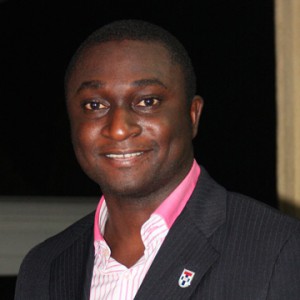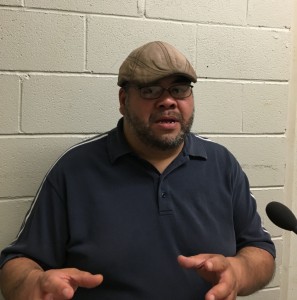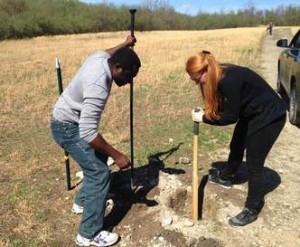
Oyeniyi Abe (Niyi) is a Fulbright Student from Nigeria conducting his Ph.D. research at Loyola University, Chicago School of Law.
As the world is dealing with the effects of climate change, a visit to Williamson, WV exposed me to a new paradigm on sustainable development and the impact of ‘ruralness’ on the health and well-being of a society. As a participant in the Fulbright Amizade service-learning enrichment activity, this trip to Appalachia showed me how old coal mines are being reclaimed for agricultural use and how community revitalization has created a pathway towards sustainable living and economic growth. Getting close to nature also offered me an opportunity for reflection. Often times we tend to neglect the very small things that matter.
I grew up on a farm in a rural community in south western Nigeria. Coming to a rural community in the United States was, for me, a rare and unique opportunity. I visited many places and met many people but the most exciting aspect of my experience was visiting the community gardens and learning the local style of growing crops. The decline of the coal business has had an effect on the people of Williamson, causing a visible decline in population as evidenced by the abandoned houses. But the general sense I got was one of hope and determination.

Jim Pajarillo, a Lawyer practicing in Williamson. Photo by Niyi Abe.
Williamson and my local community in Nigeria share some close affinities: the mountains, natural vegetation and community gardening. What struck me was the story of a man who left San Francisco to move to rural Williamson. His story is one of hope and perseverance. Jim Pajarillo told me, “The Williamson I left was full of optimism and a growing city. When I came back, the economy, which is dependent on coal, had disappeared.” He further said that the city is at a tipping point, and the next ten years are very crucial. Being in Williamson gives Jim a sense of being an agent of change and a part of the community. For Jim, Williamson is a very good place to raise kids.
The alternative to agriculture remains a pivotal pathway to societal development and longevity. Though one could feel an air of frustration and desperation in Williamson due to the coal business decline, I decided not to see that as a problem for the community. After all, every society has its own challenges. I can only feel a sense of hope in Williamson.
This was more of a journey of self-discovery for me. The Williamson Appalachia story is one that is not always found in the news. I see that the issues, challenges, and problems facing a community like this are almost the same as those facing my community in Nigeria. I believe the sustainable revitalization of a community is the only way to end world poverty and hunger.
In several discussions I had with locals, I discovered that the city has experienced ups and downs in the coal industry. One significant problem that led to its decline was that union activities were phased out, which prevented any progress towards achieving more competitive pay and better working conditions. Today, the story is different. Alternatives to coal mining have been created. Most people are growing vegetables. The farmers’ market under the Refresh Appalachia program has become huge, by using a mentor to teach people lifestyle skills related to agriculture and healthy eating. People are now aware that to stay healthy, you have to eat healthy.
Williamson still faces some challenges like finding alternatives to coal mining, upgrading the local infrastructure, and most importantly, addressing waste recycling. For instance, waste could possibly be used in some of the reclaimed coal mines and could become agricultural land in a few years’ time. Listening to some of these challenges gave me mixed feelings. Does the community want to retain its natural heritage and green vegetation, or, does it want to open up to become an industrial state? I believe the natural heritage should be preserved and sustained. At least some people like Jim would love to raise their kids in such community. A quiet place in the mountains is more beneficial than a polluted city.
The Fulbright Program, and in particular the Fulbright Amizade service-learning week, has taught me that there is still hope for sustainable development in a globalized world of environmental degradation and loss of values and cultures. This week in Williamson was an opportunity for me to become more involved in what I love doing: serving, helping others and being an agent of change.

Oyeniyi Abe (left) of Nigeria and Raffaella Taylor-Seymour of London dig a post hole for a new fence on a former strip mine.
Read more about the Fulbright Amizade service-learning enrichment activity as featured in the Charleston Gazette-Mail.

No Comments